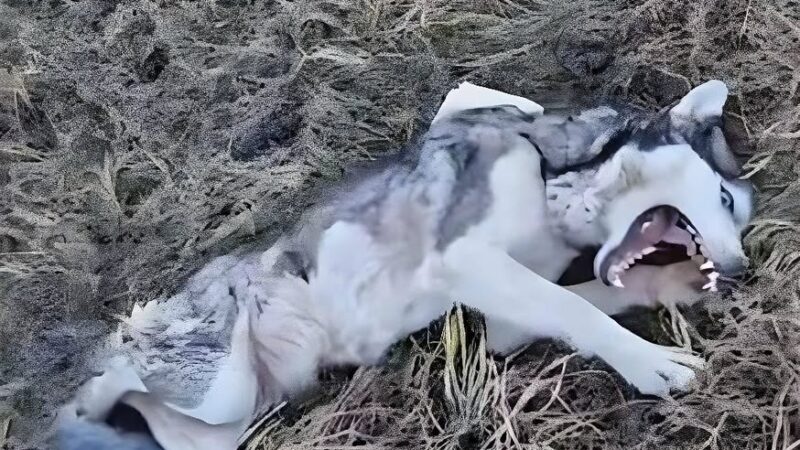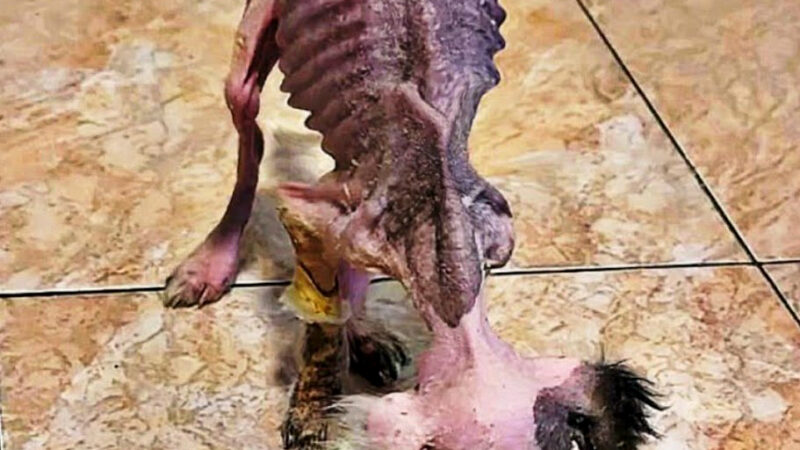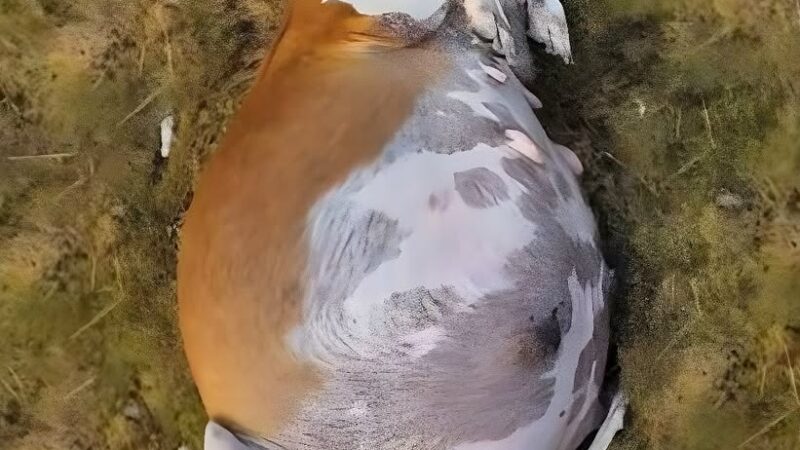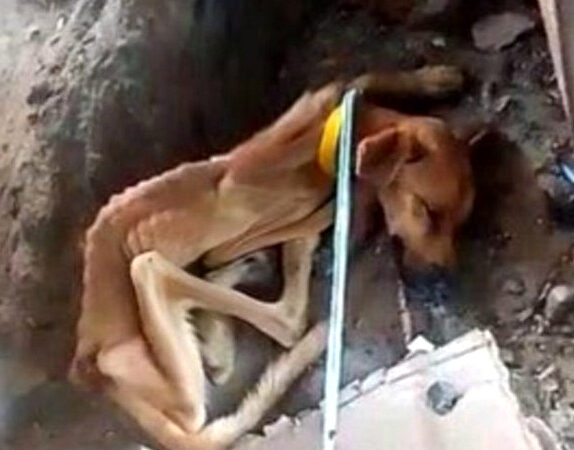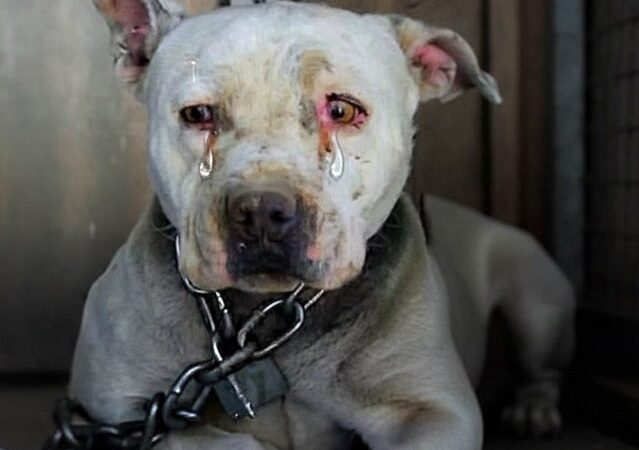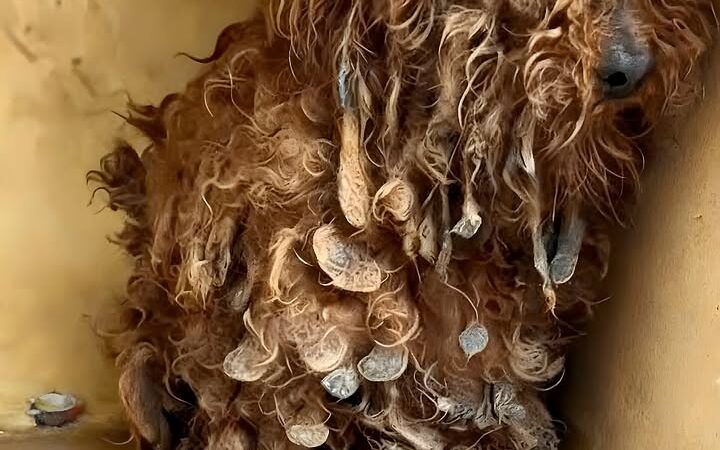From Chains to a Second Chance: The Unbreakable Spirit of a Rescued Detroit Dog

Beaker was discovered in the shadows of an abandoned Detroit house, chained and forgotten. 💔 His body trembled as he peered out from behind a garage, unsure if anyone would ever notice him. Days and nights blurred together, the chain cutting into his neck as he waited in silence, surrounded only by emptiness. His cries went unheard. His world was nothing but rusted metal, cold concrete, and loneliness. Hunger gnawed at his small frame, and the weight of isolation pressed down harder than the chain itself. Each passing day stole a piece of his spirit, yet he still wagged his tail when footsteps came near — a desperate plea for love. For too long, Beaker lived invisible, tethered to misery, his heart aching for a touch that never came. He was just a dog, yet treated like he was nothing.
Then, one day, the pattern of silent suffering was broken. The footsteps that approached were different—slower, more cautious. They didn’t belong to the fleeting shadows he was used to, but to someone who had stopped, who had truly seen him. Through the grime and despair, a pair of kind eyes met his. For a creature who had been systematically ignored, this simple act of being seen was as startling as a thunderclap. It was the Detroit Dog Rescue team, responding to an anonymous tip about a dog in distress. They saw not a piece of refuse to be disregarded, but a life hanging precariously by a thread, a soul desperate for intervention. The tail that had offered so many hopeful wags to indifferent passersby began to thump weakly against the dirt-packed ground. It was a fragile signal, a flicker of the unbreakable spirit that cruelty had failed to extinguish completely.
The rescue itself was a delicate operation, a dance of compassion and caution. Every move the rescuers made was slow and deliberate, their voices soft murmurs meant to soothe, not startle. They saw the raw, infected wound on his neck where the chain had embedded itself, a permanent collar of pain. They saw his emaciated body, each rib a stark testament to his starvation. But more than that, they saw the conflict in his eyes: a profound, instinctual fear of humans warring with an even deeper longing for connection. When the bolt cutters finally snapped through the heavy links of the chain, the sound echoed in the silence of the abandoned property. It was the sound of freedom, a concept so foreign to Beaker that he barely understood what it meant. The release of tension was immediate and physical, yet he remained frozen, unsure how to process a world that was suddenly larger than the ten-foot radius he had known for so long.
The first human touch he received in ages was not a push or a kick, but the gentle slip of a soft leash over his head, followed by a hand that rested for a moment on his back, offering warmth and reassurance. In that single touch, a dam of loneliness broke within him. The journey away from that house was a blur of new sensations. The gentle hum of the rescue vehicle, the sight of the world moving past a window, the feeling of a soft blanket beneath him—it was an overwhelming flood of stimuli for a mind conditioned by sensory deprivation. He was finally on his way to safety, but his journey toward healing had only just begun. At the shelter, the full extent of his neglect became painfully clear. He was severely underweight, dehydrated, and suffering from a painful skin infection on top of the grievous wound on his neck.
The initial days were a challenge. Beaker was a ghost in his own body, cowering in the back of his kennel, flinching at every sudden noise, and turning his head away from outstretched hands. The trauma he had endured was a prison far more confining than the chain had ever been. His caretakers understood this. They knew that his physical wounds were the easy part; healing his spirit would require a reservoir of patience and unconditional love. They didn’t push. They simply sat with him, speaking in gentle tones, tossing high-value treats near him without demanding he approach. They created a predictable, safe environment, a stark contrast to the terrifying uncertainty of his past. Slowly, painstakingly, the walls he had built around his heart began to crumble.
The first milestone was small but monumental: he took a piece of chicken from a caregiver’s flat palm. The second was when he leaned into a gentle scratch behind the ears instead of pulling away. Each small victory was celebrated quietly, another step away from the shadows of the garage. He began to learn what it meant to be a dog. He discovered the squeak of a toy, the joy of a full belly, and the comfort of a warm, clean bed. He was introduced to other calm, gentle dogs, and through them, he began to relearn the language of play, his movements initially awkward and hesitant before blossoming into clumsy, joyful romps. The haunted look in his eyes began to be replaced by a soft, curious light. The dog who was once treated like nothing was beginning to understand that he was, in fact, everything to the people who were now his world.
Beaker’s story is a powerful reminder of a dark reality that exists in the forgotten corners of our communities. He is an ambassador for the countless other animals who suffer in silence, chained, neglected, and invisible to a world that is too busy to notice. His resilience highlights the incredible capacity of animals to forgive and their innate desire to love and be loved, even after enduring the worst of human cruelty. His journey underscores the critical importance of rescue organizations, the volunteers and staff who step into these desperate situations, armed with nothing but compassion and a determination to make a difference. They are the ones who answer the unheard cries.
After months of intensive physical and emotional rehabilitation, Beaker was finally ready for the last, most important chapter of his story: finding a forever home. His transformation was breathtaking. The terrified, trembling dog was now a happy, confident companion who greeted people with a wagging tail and gentle licks. When a family came to meet him, there was an instant connection. They saw beyond the scars on his neck to the beautiful, loving soul within. The day he left the shelter with them, he didn’t look back. He was walking toward a future filled with sunny afternoons in a grassy yard, cozy evenings on the sofa, and the unwavering love of a family who would never forget him, never forsake him. Beaker’s life was no longer a story of misery endured, but one of joy chosen, a testament to the profound, life-altering power of a second chance.

